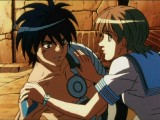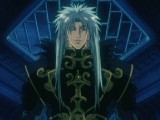

Quick Links:
Escaflowne, Movie
If ever there was an anime film that's hard to judge, it's this one. Escaflowne manages to carry on the feel of the original TV series (minus the several hours of character development) but also has enough differences from the series to make comparison of the two difficult, if not entirely undesireable. In the end, the movie has done some things wrong, and some things very right.
The story of the film begins not unlike the TV series did. High School student Hitomi Kanzaki gets whisked away to a world named Gaea, where one of the two moons in the sky is her home planet of Earth, otherwise known as the Mystic Moon to the natives. She appears inside Escaflowne, a mystical dragon armor (they're called "Guymelefs" in the TV series) which had just been acquired by Van, a young king. He greets her as the Goddess of Wings (Tsubasa no Kami). Not understanding any of what just happened, Hitomi faints.
The rest of the story deals with Hitomi's connection to the dragon armor, and why she was summoned to Gaea. The nemesis of this story is Folken, Van's brother. His resentment of Van for taking the throne instead of him started a war. Folken's wrath also has been responsible for the destruction of cities and countless deaths. Van and a little cat-girl named Merle are the only survivors from his kingdom. He seems to live only to end his brother's life. For Hitomi, life also seemed like a chore, but together with Van, would all that change?
Being only 90 minutes long, the movie obviously didn't have a chance to flesh out the story or characters nearly as well as its TV counterpart. Van and Hitomi got most of the screen time, so there was little to be told about the crazed fighter Dilandau, his mentor Jajuka, the Knight Allen, the princess Millerna, Merle, Folken, and the mysterious elf-like girl Sora. Sora is a character that did not appear in the TV series and thus should have been developed better. The sentiment of the original story remains intact, but the short length of the movie will more than likely bother some, especially fans of the series. Another difference to watch out for is the slight increase in violence. Fights are rather bloody in this movie.
Character design is another oddball in this movie. Those having seen the original series know that the characters were rather unique in appearance, having long noses instead of the traditional stub. The movie's designs are even more "out there" than the series' were. Though they still have the normal large eyes, the faces were drawn much more realistically, with real noses and even lips. The hardest thing not to laugh at is Folken's design. Though obviously not intentional, he looks like David Bowie (as seen in Labyrinth) but with grey hair. The designs for the Dragon Armors are detailed and interesting. Their appearance is similar to the Guymelefs in the series. Escaflowne's animation is both similar and different to the series. The action is a normal display of Sunrise's excellence. The movie is fairly dark (as in the kind of dark where someone just turned the lights out), giving it a rather unusual feel. Sometimes the dark look contributes to the mood of the film, but there are other times where the details in the characters and mecha are difficult to make out.
Escaflowne's music is the one area which was unquestionably as excellent as its predecessor. Yoko Kanno and Hajime Mizoguchi returned for this production and churned out another hit in the music department. Also making a return in this soundtrack is Escaflowne's theme song, giving off that signature aura of power when the so-named Dragon Armor hit the scene for a fight. Three new songs were introduced in the vocal department. Sora (meaning "Sky", performed by Shanti Snyder), the song sung by the character Sora as she calls out to Hitomi, is a powerful and alluring song. Yubiwa (meaning "The Ring", performed by Maaya Sakamoto) is the Japanese-language version of the ending song. The ending song is sweet and emotionally charged. The English-language version of the song is called You're Not Alone, and is every bit as good as Yubiwa in feeling and in lyrics. Both versions of the song appear on the original soundtrack for the movie.
Escaflowne comes in a standard DVD release, and a 3-disc Ultimate Edition. The Ultimate Edition contains two extra discs: one with the full original soundtrack, and the other with several bonus materials. The bonus disc includes the film's trailers, an art gallery of posters for the movie, a production art gallery, several exclusive interviews, and a video from the film's premiere at Anime Expo 2000. The art galleries were displayed well, with clear images and an optional overlay of English translations for the notes on the sketches. The video from AX 2000 had some problems with muffled voices, but is otherwise informative. The interviews are a very worthy addition to the extras. The cast interview was not only informative, but fun to watch. Within the interviews is also a live performance of Yubiwa by both Maaya Sakamoto and Kim Su Jin, the singer of the Korean version of the song. This is a great set of extras, and is something every Escaflowne fan would likely be pleased with. As a bonus, the menus on the extras disc are easily navigated, and the menu animations were outstanding. Another treat is the booklet that comes in the Ultimate Edition. It gives a history of Escaflowne starting with the TV series, and also contains comments from several of the production staff members. Even in disregarding the mountain of extras, those who don't have the soundtrack should get the Ultimate Edition. The soundtrack alone makes it worth having.
You might not see the Escaflowne movie as a worthy purchase if you've seen the series first. As a standalone work, however, I recommend the movie to all adult viewers. It is not entirely inappropriate for children, but discretion should be used, since the plot centers around revenge and conflict. Though the film has its downs, Maaya Sakamoto's voice acting and Yoko Kanno's music are as outstanding as usual, drowning out any reason to not view this film.
Distributor: Bandai Entertainment Creator: Sunrise Released: 2000
Plot: A Character Design: B- Animation Quality: B+ Music: A+ Overall: B+



